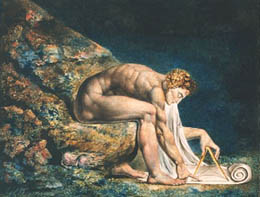The painting is of Newton, by William Blake (1805). The original is in the Tate Museum in London, England.
 |
The painting is of Newton, by William Blake (1805). The original is in the Tate Museum in London, England. |
|
We finished the small part of §5.3 I didn't get to last time.
We spent a few minutes on a non-examinable diversion: Einstein's Equivalence Principle of 1907. This principle is one major foundation of the General Theory of Relativity.
We largely finished Chapter 6. I have a very small application of this material to jumping bullfrogs, and a couple of brief remarks about §6.4, which I will do next time. Note that §6.4 itself is not part of the syllabus for PHY138.
| A Flash animation similar to the text's Figure 6.17 is available via the button to the right; separate window. | |
| In class we did a demonstration. A Flash animation of the demo is also available. |
| We asked this question about the difference between gravity and acceleration at the end of the last class, and asked it again today. |
The correct answer is that there is no experiment that can tell the difference between acceleration and gravity. After the first round of asking for your answers, we had you discuss it among yourselves in small groups. Here are rough percentages of the answers:
| Before Discussion | After Discussion | |
|---|---|---|
| 1. Yes | 50% |
30% |
| 2. No (correct) | 50% |
70% |
However, there is a small subtlety about this. If you are interested, you can learn more here.
| We asked this question about a bucket and a cork. The correct answer is that the cork moves toward the bottom of the bucket: 3. |
Here is how you collectively answered this question:
| 1. Stationary | 20% |
|---|---|
| 2. Up | 70% |
| 3. Down (correct) | 10% |
| We asked this question about projectiles. The correct answer is 2: the ship that is furthest away gets hit first. |
For this question, we also had some discussion.
| Before Discussion | After Discussion | |
|---|---|---|
| 1. Nearest Ship | 0% |
5% |
| 2. Furthest Ship (correct) | 50% |
70% |
| 3. Same Time | 50% |
25% |
| Pdf version of the PowerPoint on the side screens. | |
| Today's Journal. |
| The arrows let you jump to the previous/next class summaries. |